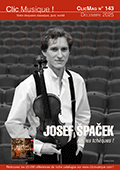 On sait peu de choses sur Emanuele Barbella (1718-1777) sinon qu'il fit une carrière de compositeur violoniste essentiellement à Naples, fréquentant aussi bien les scènes de théâtre, les salons de l'aristocratie que le conservatoire où il enseignait le violon. Sa musique de style galant et fantasque, est représentative de la musique napolitaine de la seconde moitié du dix-huitième siècle, vivide, solaire, inspirée largement par le théâtre et la pantomime. S'il minorise l'art du violoniste Burney reconnaît en lui le compositeur : « Although the quality of his sound sweet and equal, he is inferior to Nardini... Barbella on the other hand, knows music well and has a lot of imagination in his compositions with a tinge of sympathetic madness ». Ce disque du Quartetto Pizzcarto intitulé justement Simpatica Follia nous propose six Duos en trois mouvements dont les caractères s'inspirent de la commedia dell Arte. Ils sont écrits pour violons ou mandolines avec basse ad libitum. Sur l'édition parisienne (1870) il est précisé l'ajout d'une guitare baroque, d'un violoncelle ou de l’incontournable calascione, l'instrument d'accompagnement napolitain par excellence. En composant pour le joueur de mandoline Gervasio, le violoniste Barbella renouvelle l'approche technique de l'instrument et en tire des sonorités inédites notamment avec l'usage des pizzicati. L'option des interprètes ici a été de jouer ces duos avec un violon et une mandoline, choix judicieux qui correspond avec la pratique de l'époque et offre une qualité de timbres supérieure. Doté d'une belle énergie, le Quartetto PizzicArco illustre à merveille la fameuse formule de Charles Avison « music as conversations among friends ». Mention spéciale à Mauro Squillante, le mandoliniste, d'une vélocité stupéfiante. Un rayon de soleil ! (Jérôme Angouillant)  The “sympathetic madness” was exactly that spark that continued to distinguish the instrumental production of the “Neapolitans” and which also transpires from the literature by Barbella dedicated to almandol, an instrument very dear to aristocratic circles as can now be deduced, in a self-evident way, from recent studies on this tool always betrayed by a history that relegated it exclusively to a “street” or just “popular” practice. The Six Duos were composed for 2 violins or 2 mandolins, as was customary in the practice of the time, which saw the same compositions performed on different instruments. Barbella also composed music for mandolin alone. Although his writing is less idiomatic than that, for example, of his fellow countryman Giovanni Battista Gervasio (c. 1725 - c. 1785, himself a mandolinist), Barbella manages to combine a refined compositional style, which he learned in the Neapolitan conservatories, with techniques and the pizzicato sound of the new mandolin, creating a new way of writing, with harmonies and sounds that had probably never been heard before. The listener can still perceive this new sound today in the performance offered to us on this CD, where the choice of the musicians was to perform the Duos not with two violins or two mandolins, but with a violin and a mandolin. A sound that we can legitimately imagine to be not so far from that heard by the listeners and performers of the time, given the great diffusion that the instrument had throughout Europe, as the iconography of the time illustrates.
 |
